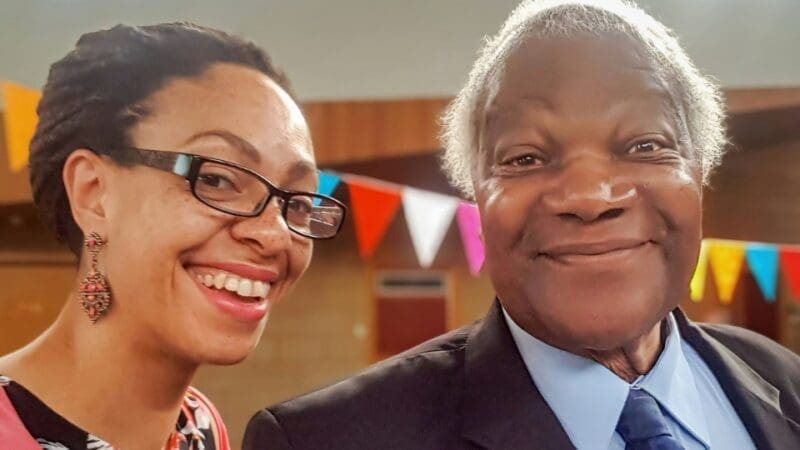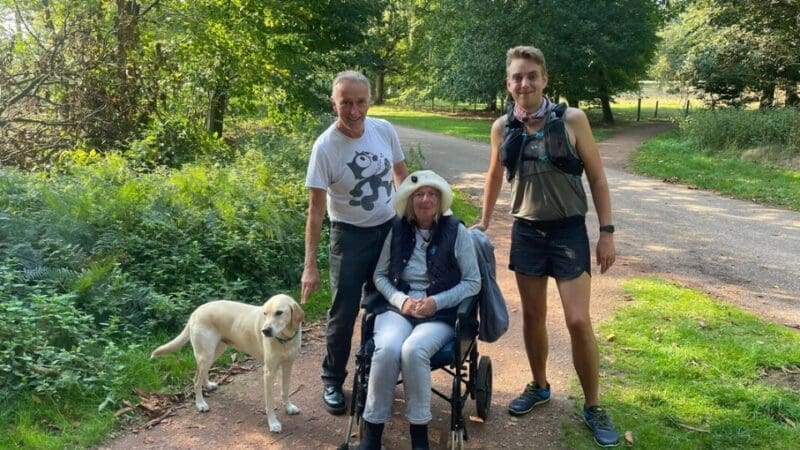The early symptoms of dementia are often relatively mild and can easily go unnoticed or be mistaken for other physical or mental health conditions. Common signs of early-stage dementia include memory issues, slowed thinking and difficulties with communication. Being aware of these early signs and symptoms and seeking medical advice can help to get a prompt diagnosis.
This guide, written by our specialist Admiral Nurses, explores the causes, symptoms, treatment and management of the early stages of dementia.
What are the early stages of dementia?
In the early stages of dementia, a person will start to experience problems that affect their everyday life. They may notice these changes themselves, or they may first be recognised by their family, friends or colleagues. While some people may not think it is necessary to speak to their doctor at this stage, it is important to see a GP to rule out other conditions or start the process of getting a diagnosis so the right support can be put in place early on.
How many stages of dementia are there?
It is generally accepted that there are three main stages of dementia: early, middle and late. However, the condition will affect everyone differently. Read more about each stage and what to expect.
The signs and symptoms of the early stages of dementia
Cognitive changes
Concentration and memory
In the early stages of most forms of dementia – including Alzheimer’s disease – the person may have mild problems with their concentration and memory. However, in some forms of dementia, such as frontotemporal dementia, the person’s memory may be unaffected at first.
While the person’s short-term memory and recall of recent events may be affected, their memories of childhood and their past life may remain very clear. This may mislead people into thinking the person’s memory is okay – but if family, friends or colleagues spend some time with the person, it may become apparent that they are repeating themselves, asking the same questions again and again or having difficulty recalling things that happened recently.
Language and communication
A person who has early stage dementia may have problems with language and communication, mainly affecting word-finding or following and responding to conversations. This may be more noticeable in some forms of dementia, such as frontotemporal dementia or vascular dementia.
Planning, problem-solving and decision-making
People in the early stages of dementia may have difficulties with planning, problem-solving and decision-making. This can be particularly noticeable in types of dementia that cause changes in the frontal part of the brain, such as frontotemporal dementia and vascular dementia.
Getting lost and misplacing things
In early-stage dementia, people may begin to get lost in familiar places due to difficulties in orientation and a loss of recognition of cues that they usually rely on, such as road signs, road layout and landmarks. They may find it hard to judge distances or hazards so they may trip more frequently, bump into things or have difficulty with driving skills like judging speed and parking.
In some types of dementia, particularly Alzheimer’s disease and vascular dementia, the person may also lose or misplace items and find it difficult to remember where they might have put them.
Behavioural changes
Personality and behaviour changes
In the early stages of certain types of dementia – particularly frontotemporal dementia – memory and concentration issues may be less pronounced, but personality and behaviour changes may occur. For example, the person may be more irritable or irrational, and behave in impulsive or inappropriate ways, such as staring or using sexual language.
Family, friends and colleagues may be more aware of these changes than the person with dementia and this can cause some tension – for example, the person may be resentful of other people’s concern or reluctant to visit the doctor.
Low mood and anxiety
If the person in the early stage of dementia is aware of the changes they are experiencing, they may feel frightened, worried, anxious and depressed about what is happening to them. Depression and anxiety may also be signs of dementia. Learn more about managing anxiety and depression.
Physical changes
Physical changes tend to be less pronounced than other changes in the early stages of dementia. However:
- People with early-stage Alzheimer’s disease can sometimes have problems using stairs because of difficulties with visual perception and judging perspectives
- Difficulty walking, or stroke-like symptoms such as muscle weakness or paralysis, can be a sign of vascular dementia
- Lewy body dementia is characterised in the early stage by visual hallucinations, sluggish movement and repeated falls or fainting
- In Parkinson’s disease dementia, the person may experience tremors, shaking, slowed movement and rigidity in the muscles
Do different types of dementia have different early signs?
While some early signs of dementia are common to most forms, there are differences. For example:
- In Alzheimer’s disease, the most noticeable early symptoms include difficulties with memory and concentration
- People with early-stage vascular dementia often have problems with concentration, problem-solving and decision-making, and show changes in personality and behaviour. Memory problems are less common at first
- In frontotemporal dementia, the initial symptoms often include difficulties with communication, reduced motivation and unusual or inappropriate behaviour
- People with Lewy body dementia may experience hallucinations, fluctuations in alertness, sleep problems and mood changes
Some people have mixed dementia, which is a combination of two or more forms of dementia, and will experience early symptoms of each type.
What might the symptoms of the early stages of dementia be confused with?
There are many different conditions that can mimic the early signs of dementia including infections, delirium, vitamin B12 deficiency, depression, anxiety, diabetes and medication side effects. These conditions are often treatable, so it is important to visit a GP for tests to identify and manage these conditions.
Getting a diagnosis of the early stages of dementia
If you are concerned that you or someone you know are showing signs of dementia, do not put off seeing a GP. In an initial appointment, the doctor will ask about the problems the person is having, when they started and how they affect their daily life. They should also briefly test the person’s memory and cognitive abilities, do a physical examination and arrange blood and urine tests to check for other possible causes of their symptoms.
If other health conditions with similar symptoms to dementia are ruled out and there are still concerns about the ongoing changes, the GP may refer the person to a specialist memory assessment team (often known as a ‘memory clinic’) for further tests.
The importance of an early diagnosis
An early diagnosis of dementia can help the person and their family to understand what type of dementia they have, why the changes they are experiencing are happening and what they can do to manage them. It also enables them to have conversations about how to live as well as possible with the diagnosis and to plan for the future.
For some people, medication may be available in the early stages to help slow the progression of dementia, so it is important to see the GP if you are noticing symptoms so that if suitable, treatment can start as soon as possible.
Treatment for the early stages of dementia
While dementia is a progressive condition, and currently, there is no known cure, medication may help to relieve some of the symptoms or slow its progression in some forms of dementia, particularly Alzheimer’s disease. However, bear in mind that medication is not suitable for everyone with dementia.
There are also strategies for managing the early stages of dementia to help the person maintain their quality of life, for example using memory aids, learning new tips for communication, and accessing support and benefits to help them stay independent for as long as possible.
Supporting someone in the early stages of dementia
Dementia can cause changes in personality, behaviour and ability to cope with challenging situations. This can be frustrating for the person with dementia and those around them.
During the early stages of dementia, it is important that the person is supported to maintain their independence with everyday tasks such as work, family life, socialising, hobbies and holidays. Focus on their strengths, rather than what they might be struggling to do. Look into opportunities for new activities and interests to keep the person mentally stimulated, avoid isolation and maintain connections.
A person with dementia may also struggle to cope with the emotional impact of their diagnosis. Family and friends can often provide a great deal of help and reassurance, but they may wish to speak to their GP or dementia specialist about other support they can access, for example from a Community Mental Health Team. Support groups can also be helpful, giving them a space to share experiences and form important social connections. Read more about the emotional impact of a diagnosis and support available.
How to talk to someone with early stage dementia
Small changes in your approach can make a big difference to someone in the early stages of dementia. You could try:
- stopping what you are doing and focusing entirely on the person
- limiting distractions such as the TV or radio
- saying their name when talking to them
- touching their arm to attract their attention, if they feel comfortable with this
- smiling
- speaking slowly, clearly and in short sentences, but without being patronising
- using simple and straightforward language
- listening carefully with empathy and understanding
- giving the person plenty of time to answer
- maintaining appropriate eye contact
- being specific – for example, try not to use pronouns such as ‘he’ or ‘she’ when talking about others; use their name instead
- avoiding open-ended questions or offering too many choices
If the person seems more confused than usual and is having increasing trouble communicating, it is a good idea to seek advice from their GP.
Activities for the early stages of dementia
Dementia can cause people to withdraw from activities and social contact, so it is important to help them maintain those interests and relationships to support their quality of life. This could include supporting them to continue with everyday activities such as work, spending time with family and friends, exercise, household tasks, holidays and day trips.
It can also be helpful for a person with early-stage dementia to try new meaningful activities that bring enjoyment and a sense of purpose. These might include joining community groups such as a choir, art group or gardening club, learning a new skill like a language or craft, volunteering, taking up a sport, or joining a support group for people with dementia. Explore more ideas for meaningful activities.
How does early-stage dementia progress?
The progression of dementia will depend on many factors, including:
- the person’s age
- how soon they received a diagnosis after the onset of symptoms
- the type of dementia
- their current physical and mental health
- lifestyle factors like diet and exercise
Everyone has a different experience of dementia so try not to focus on how quickly it will progress, and instead make time for enjoying each other’s company and making new memories.





